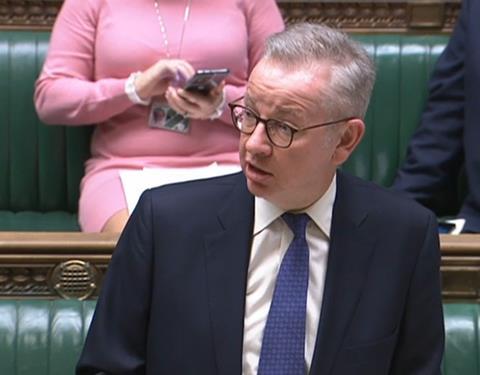Plan for developers to fund fire safety work could lead to more delays and legal challenges, experts say
The industry has questioned the fairness and effectiveness of Michael Gove’s plan to force developers into contributing towards a £4bn fund for cladding remediation.
The housing secretary yesterday announced plans for house builders to pay into the fund, which will be used to carry out work on tower blocks between 11m and 18m in height.
Gove has threatened to restrict grant funding, use planning powers and pursue developers through the courts if they don’t pay up.

He has given firms a deadline of early March to agree a fully funded plan of action.
But some have questioned whether the approach will work and have raised concerns over whether it is fair, with many saying public funding should also be used to foot the bill.
Graham Watts, chief executive of the Construction Industry Council, warned that without taxpayers’ money the remediation will become a “lottery” in areas where developers are unwilling or unable to contribute.
Writing in the Spectator, Watts said: “Any construction companies and developers have already accepted the responsibility to fund remediation work and I expect that this will now extend to buildings less than 18m.
“Others will no doubt procrastinate by continuing to pass the buck of blame (especially, and wrongly, to the building control profession) and, of course, some will no longer be in business. Where do the funds come from in such cases?”
Home Builders Federation executive chair Stewart Baseley said action must be proportionate and “involve those who actually built affected buildings and specified, certificated and provided the defective materials on them”.
Mike Robinson, chief executive of the British Safety Council, said it was “right that the construction industry continues to play its part” but said the government should also “shoulder its own responsibilities”.
He added: “We need to see all sides taking a positive and constructive approach to discussions between now and March.”
>> See also: Gove to ‘go after’ developers not complying with post-Grenfell safety rules
>> See also: Government to force housebuilders to pay £4bn cladding bill
Others to question whether the fund will actually raise enough money to carry out all the repairs required included RIBA president Simon Allford.
He said: “This new plan should provide some welcome relief to the many homeowners who have unduly suffered at the hands of our flawed building safety regime – and we welcome that. We remain concerned however that the new funding mechanism will not raise enough money to fully address the widespread fire safety or structural defects that exist up and down the country.”
Geeta Nanda, chair of the G15 group of large housing associations in London, said: “A truly comprehensive solution to this crisis is still required.”
There is also concern that Gove’s announcement will lead to legal challenges and confusion.
Jeremy Raj, national head of residential property at law firm Irwin Mitchell, said laying the responsibility for the cladding scandal solely at developers will risk more delay for leaseholders caught in unsaleable homes.
He said: “Many developers will be puzzled as to how and to what extent they can justify such expenditure on a ‘voluntary’ basis in the context of their obligations to shareholders, and a lack of direct responsibility, particularly given clear evidence of contributory negligence by others.
“Fixing dangerous buildings should be dealt with as a priority using up-front government money, with clawback provisions activated as soon as the extent and identity of all liable parties has been established under due legal process.”
Trade body the Finish & Interiors Sector said: “The only winners will be the lawyers and the administrators and the real losers will be the small and medium-sized contractors and subcontractors, who bound by heavily amended contracts designed to deflect risk, operating in exceptionally difficult circumstances will be left holding the bill when the music stops.”
Meanwhile, Lisa Nandy, shadow housing secretary, questioned whether the government can really target developers for costs without legislation.
She said: “If [Gove] is serious about going after the developers why is he not putting these powers into the Building Safety Bill now? The only trick that he has up his sleeve is to ban them from [the] Help to Buy [housing scheme] and we know that the impact of that, though welcome, will be marginal.” The initiative, which gives government help to first-time buyers with the costs of buying a new home, has been scaled back since it was introduced nearly nine years ago.
Last month, Rydon Homes was banned from Help to Buy following “concerns over unacceptable business practices in their company group” which have emerged at the Grenfell Inquiry, Gove said.
The housebuilder has been excluded from the scheme meaning it will no longer have government support and cannot market its properties to first time buyers, with the offer of government-backed loans.
Gove said he had made the decision because of Rydon Maintenance’s involvement in the refurbishment of the Grenfell tower where it was the main contractor for the work. The building caught fire in June 2017, claiming the lives of 72 people.


























No comments yet